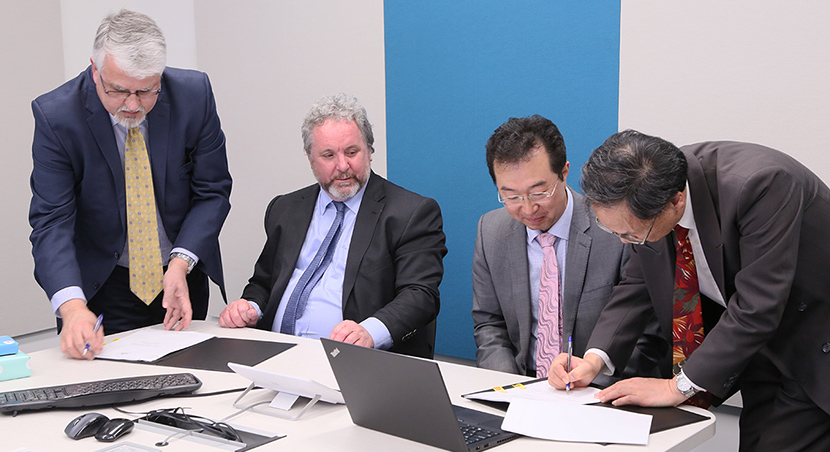Deakin scientists are investigating a promising new way to diagnose cancer early – with potential to improve survival rates and quality of life for patients in the future.
Early cancer detection and treatment will be under the microscope at a new joint laboratory, established through a collaboration between Deakin University and Chinese biotech company Suzhou GenePharma.
The lab’s primary project is the commercial development of chemical, antibody-based, liquid biopsy technology that will enable the disease to be picked up early.
If successful, the Deakin project will bring to the market a simple blood test that can detect fatal diseases like pancreatic or lung cancer, where late detection is associated with low survival rates.
Project leader Professor Wei Duan, from Deakin’s School of Medicine, said that despite recent advances in understanding about cancer and the invention of many new drugs, it still remained the leading cause of death worldwide.
“This is because by the time most cancers are diagnosed using traditional methods like a tissue biopsy or PET scan, many cancer cells may have already spread to other parts of the body,” Professor Duan said.
[testimonial_text]Currently, there are only a small number of cancers that can be diagnosed early, but if we can use a simple blood test, we could potentially see much better patient outcomes.[/testimonial_text]
[testimonial_picture name=”Professor Wei Duan” details=”Deakin School of Medicine”]
 [/testimonial_picture]
[/testimonial_picture]The new Suzhou GenePharma-Deakin University Joint Laboratory of Aptamer Medicine will bridge this gap using its patented chemical antibody technology to enrich the biomarkers in the blood that signal the presence of cancer.
“We know that most forms of cancer will shed some of their cellular or molecular components into the blood even at an early stage of tumour development, before spreading to other parts of the body,” Professor Duan said.
“These are excellent markers for earlier cancer detection, and the blood is one of the most convenient sources for repeated sampling.
“However most, if not all, cancer markers are not unique, meaning that they are also found in normal cells or tissues. To detect the cancer marker among a sea of normal cells in the blood is akin to finding a needle in a haystack.”
This is where the expertise of Professor Duan and his team comes in. They have been exploring a powerful molecular probe – called an aptamer or chemical antibody – that can bind to cancer biomarkers specifically.
“These molecular probes function similarly to laser-guided precision bombs and could be used to detect cancer using as little as one millilitre of blood,” Professor Duan said.
Once developed, the test will then go through rigorous clinical trials in China, where patients with and without cancer will have blood taken and assessed to determine if the test can maintain sufficient accuracy.
Professor Duan said once the test made it through the trial process, the team would apply to the China Food and Drug Administration for formal approval, then follow with applications to similar government bodies in other countries, including Australia, so the test could be used globally.
“While it may be several years before we see this test being used by clinicians around the world, we believe it’s very promising that we will be able to deliver successful products that will significantly improve,” he said.
Main photograph (left to right): Mr Brett Luxford, Director Investment & Attraction, City of Greater Geelong, Dr Greg Pullen, Senior Manager – Commercialisation and Translation, City of Greater Geelong, Mr Andrew Wear, Director, MedTech and Pharmaceuticals, Department of Economic Development, Jobs, Transport and Resources (DEDJTR), Prof Peter Hodgson, Deputy Vice-Chancellor Research, Dr Peter Zhang, CEO, GenePharma, Prof Wei Duan, Professor – School of Medicine, Mr Tim Ellis, Manager Enterprise Geelong & Events
Published by Deakin Research on 22 September 2017





